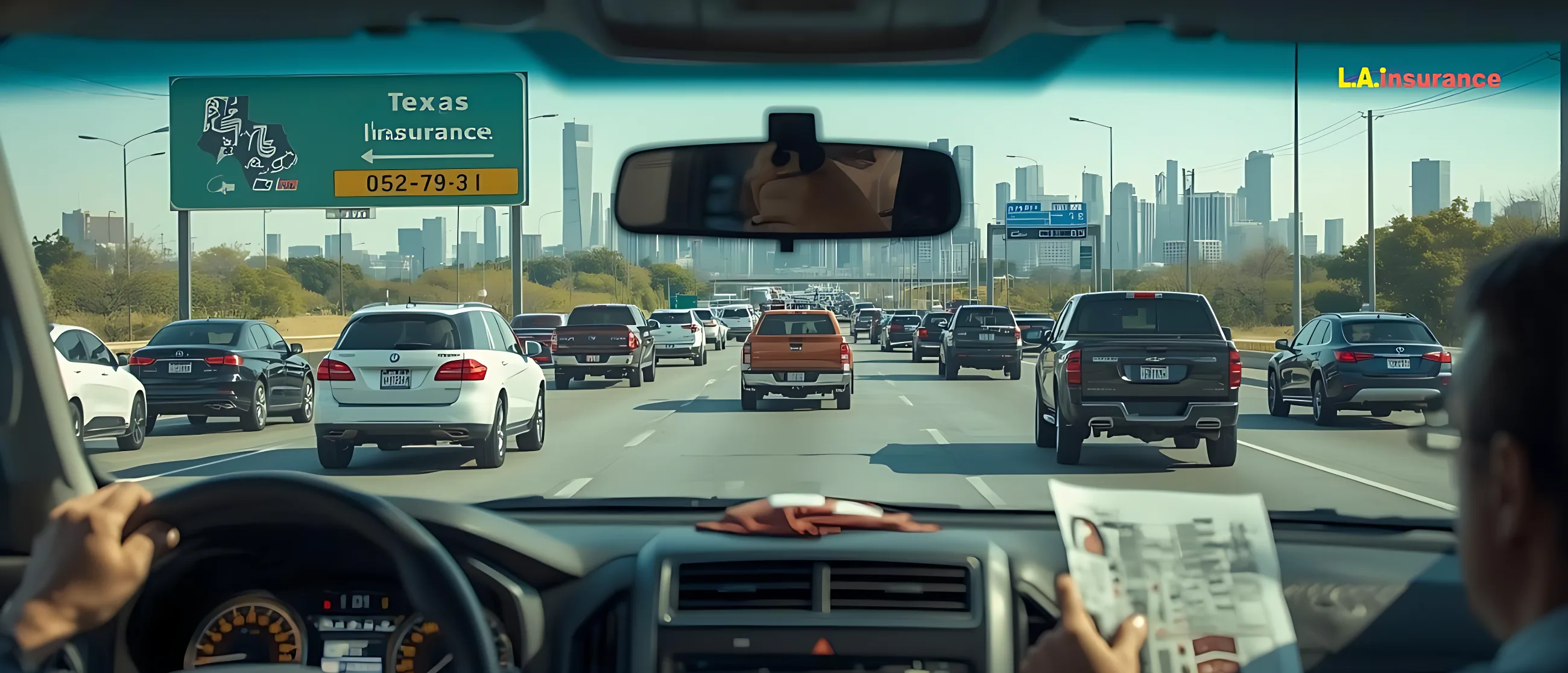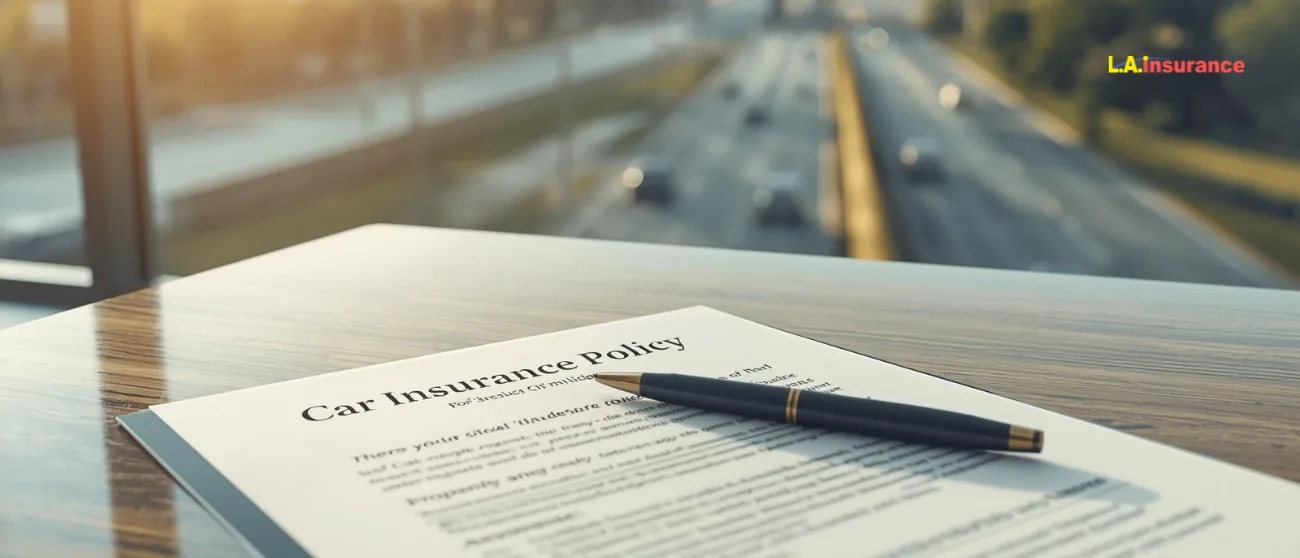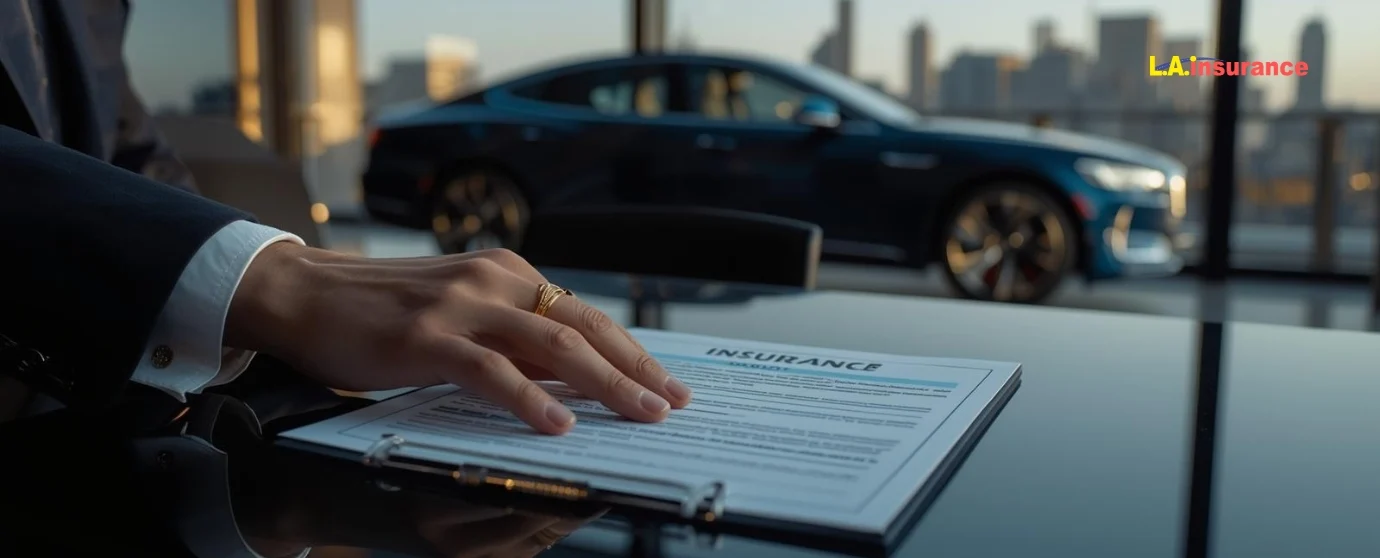
Publish Date: 25-11-2024
Auto Insurance
Last Updated: 22-02-2026
Michigan Auto Insurance Requirement: A Complete Guide
Are you curious about Michigan's auto insurance requirements? Or how much coverage you need to drive legally? You're in the right place.
First off, car insurance isn't optional in the Great Lake State. Every driver must have specific types of coverage. If you're new to the state's insurance laws, it can feel overwhelming. Michigan's no-fault insurance rules, choosing the right Personal Injury Protection (PIP) options, and understanding legal requirements can be confusing.
So, what does Michigan expect from its drivers? At a minimum, you'll need:
- Personal Injury Protection (PIP)
- Property Protection Insurance (PPI)
- Liability coverage
Here’s what you’ll learn in this comprehensive article about Michigan car insurance requirements:
- Michigan Minimum Insurance Requirements
- Optional Coverages That Might Be Worth Considering
- You’ll Be Able to Make Smart Choices About Your Coverage
What Is Michigan’s State-Mandated Auto Insurance Requirements
Michigan’s auto insurance requirements can seem complex, but they are actually designed to protect both drivers and the public. As a no-fault state, Michigan mandates a specific set of coverages that all drivers must carry. These cover everything from injuries to property damage. Here’s a breakdown of each mandatory component to help you understand what you need to legally drive in Michigan.
Mandatory No-Fault Insurance
Let’s first understand the mandatory no-fault insurance system in MI. Michigan operates under a unique no-fault insurance system. This means in the event of an accident, each driver’s insurance activates and pays for their own medical expenses, regardless of who caused the crash.
Unlike a fault-based insurance system, no-fault insurance is intended to simplify claims and make sure that those injured in the car crash receive medical care immediately. However, within this system, you won’t get coverage for your vehicle damage if you’re at fault. That’s why some drivers choose other types of car insurance coverage, including comprehensive and collision coverage which are optional.
So, the basic auto insurance policy you must have in Michigan has three parts:
- Personal Injury Protection (PIP)
- Personal Property Protection (PPI)
- Residual Liability Insurance— Bodily Injury (BI) and Property Damage (PD)
Personal Injury Protection (PIP)
Personal Injury Protection, or PIP, is one of the core coverages in the Great Lake State’s no-fault insurance system. Generally, if you’re injured in an accident, PIP covers medical expenses and provides financial assistance for lost wages, replacement services, and even childcare.
Michigan car insurance companies typically offer different PIP coverage levels, which allow you to choose an amount that fits your health coverage and budget. If you do not make a choice, your policy defaults to unlimited PIP. On top of that, you’ll have the flexibility to select a lower limit if you have qualifying health insurance. So, you should always talk to your insurer if you already have a health insurance plan for yourself.
Property Protection Insurance (PPI)
Property Protection Insurance, or PPI, is another unique requirement in the Great Lake State. This one provides up to $1 million for damage your vehicle causes to other people’s property within the state, such as buildings, fences, light poles, trees, or parked cars (Via Department of Insurance and Financial Service, 2026).
Unlike liability coverage, PPI does not cover damage to vehicles involved in moving accidents or property damage that occurs outside of Michigan.
Bodily Injury and Property Damage Liability Coverage
While Michigan’s no-fault system covers your medical expenses, liability coverage is also required to protect others if you cause harm. This coverage is known as Bodily Injury and Property Damage (BI/PD) liability. This type of car insurance coverage kicks in if you get into an accident that injures someone else or damages property outside Michigan.
Here's a simple breakdown of the default and minimum limits for Bodily Injury (BI) and Property Damage (PD) coverage in Michigan:
Default Limits for BI/PD Coverage (Via Michigan New Auto Insurance Law, Choosing Bodily Injury Coverage):
- Bodily Injury: Up to $250,000 for one person injured or killed in an accident.
- Bodily Injury: Up to $500,000 for multiple people injured or killed in an accident.
- Property Damage: Up to $10,000 for damage to property in another state.
Minimum Coverage Limits (Via Michigan New Auto Insurance Law):
- Bodily Injury: Up to $50,000 for one person injured or killed in an accident.
- Bodily Injury: Up to $100,000 for multiple people injured or killed in an accident.
- Property Damage: Up to $10,000 for damage to property in other states.
We recommend higher coverage limits since medical and property damage costs can quickly exceed these minimums.
Why Does Michigan Require No-Fault Insurance?
The primary intention of Michigan's no-fault auto insurance system is to simplify the process after a car accident and make sure that injured parties get the care, they need without delay.
Besides, it also reduces the time and expense associated with legal disputes about fault. By requiring each driver’s insurance to cover their own injuries and damages, Michigan’s no-fault system creates an easier way to handle claims. This way, policyholders can focus on recovery.
Under Michigan's no-fault insurance law, every driver who gets into a car crash relies on their own insurance coverage for medical costs, lost wages, and certain related expenses, despite who caused the accident. Within this system, injured drivers and passengers get fast, guaranteed PIP benefits, which greatly reduce the need for lawsuits in most cases.
However, it’s important to note that Michigan’s no-fault system does not cover vehicle damage when you’re at fault, nor does it pay for damage you cause to other moving vehicles. For this reason, drivers often purchase optional collision and comprehensive coverage to protect their cars. If you have an antique or collectible car, or if it is stored in one of the best car museums in Michigan, it’s a good idea to get storage coverage for it.
Learn more from the L.A. Insurance experts. Read our research-based article on why auto insurance in Michigan is so expensive.
Key Difference Between Michigan’s No-Fault System and Other State’s Insurance Laws
Michigan’s no-fault insurance laws are unique compared to those in other states, which operate under an at-fault or modified no-fault system. Here’s how Michigan’s no-fault insurance compares:
Feature | Michigan’s No-Fault System | Other States’ Insurance System |
Immediate Benefits or Quick Payouts | Your own insurance company pays for medical expenses, wage loss, and other economic damages, regardless of fault. This is helpful in urgent medical cases. | The at-fault driver's insurance pays for damages, requiring determination of fault before benefits are paid. |
Higher PIP Coverage Options | Michigan offers PIP levels that exceed typical medical payments in other states. Options include unlimited PIP coverage and lifetime medical benefits for catastrophic injuries. | These features are mostly rare in other states. |
Medical Benefits | Unlimited medical benefits for injuries sustained in auto accidents. | Caps on medical benefits, limiting coverage for accident-related injuries. |
Property Damage | Property Protection Insurance (PPI) covers up to $1 million for damage to other people's property within the state. | Coverage varies by state, generally not including high limits seen in Michigan. |
Litigations | Reduced litigation by eliminating the need to prove fault for receiving benefits. | More lawsuits as parties look to establish liability and recover damages. |
Michigan No-Fault Car Insurance Policy: Pros
- Faster Medical Claims
- Guaranteed Coverage
- Reduced Legal Costs
Michigan No-Fault Insurance Policy: Cons
- Higher Premiums (As insurers cover more up-front medical costs)
- Limited Lawsuit Options (e.g., you can only sue for non-economic damages)
At-Fault Insurance Policy: Pros
- Potentially lower premiums
- More Lawsuit Flexibility
At-Fault Insurance Policy: Cons
- Delayed Claims
- Higher Legal Costs
The Role of Michigan Catastrophic Claims Association (MCCA)
The Michigan Catastrophic Claims Association (MCCA) is very crucial in the no-fault system. It covers catastrophic injury expenses. When a driver with unlimited PIP coverage faces severe medical costs from an accident, the MCCA steps in. It reimburses insurers for claims that exceed a certain threshold. This helps keep high costs from impacting everyone’s premiums too severely.
The MCCA is funded through a per-vehicle fee. Drivers pay this as part of their auto insurance premiums. This fund allows Michigan to maintain its commitment to lifetime medical coverage for those with catastrophic injuries. It's one of the most significant benefits of Michigan’s no-fault system. By pooling resources across all insured drivers, the MCCA helps reduce the financial burden of these claims. It creates a safety net for Michigan drivers facing life-altering injuries.
Let’s Understand Personal Injury Protection (PIP) Options in Michigan
As you already know PIP is a central part of Michigan’s no-fault insurance. No matter who is responsible for the accident, if you’re carrying adequate PIP coverage, you’ll have financial safety whether it’s for medical expenses, lost wages, or other costs.
Michigan state’s recent reforms now offer several levels of PIP coverage which allow the drivers more choice and flexibility.
PIP Coverage Levels and Costs
Michigan’s no-fault reforms have made it possible to choose between different PIP coverage levels.
As of the recent no-fault law reform (July 2, 2020), these are PIP the coverage levels available (Via Michigan Govt, Brief Explanation of Michigan No-Fault Insurance):
- Unlimited: Covers all accident-related medical expenses without a cap.
- $500,000 Per person, per accident.
- $250,000 per person, per accident.
- $250,000 with exclusions: This allows opting out of PIP medical coverage if the insured or household members have other health insurance that covers auto accident injuries.
- 50,000 Limit: Limited to those enrolled in Medicaid, and household members must have other health insurance or auto insurance.
- Opt-Out for Medicare Enrollees: Those with Medicare Parts A and B can choose to forgo PIP coverage if all household members also have health coverage for auto-related injuries.
Each level of coverage comes with different costs. However, it mostly depends on your circumstances and the auto insurance company you choose. Generally, higher coverage levels come with higher premiums but more financial protection in case of a severe accident.
Coordinated Vs. Uncoordinated PIP Coverage
In Michigan, PIP coverage can be “coordinated” or “uncoordinated,” which affects how medical expenses are paid if you have other health insurance. In this context, many car insurance policyholders ask whether health insurance covers auto accidents in Michigan.
So let’s understand these two types of PIP coverage here:
- Coordinated Coverage: With this option, your health insurance pays first, and your PIP coverage steps in only if needed. This can save you money on your premiums because your auto insurance isn’t the primary payer.
- Uncoordinated Coverage: In this setup, PIP covers all accident-related medical expenses, regardless of your health insurance. Though it’s expensive but provides quicker payments for medical bills since it doesn’t depend on your health insurance.
What Happens if You Choose Lower PIP Coverage
If you choose lower PIP coverage, it can reduce your insurance premium. However, it’s important to weigh the potential trade-offs. Here’s what you need to consider:
- Limited Coverage in Severe Accidents: Lower PIP limits will probably run out quickly in case you face significant medical bills resulting from a serious accident. Once your PIP benefits are exhausted, you may have to rely on your health insurance.
- Out-of-Pocket Expenses: With lower PIP limits, you risk paying more out of pocket if your health insurance doesn’t cover all your accident-related medical expenses. So, you should make sure to check your health policy’s coverage for car accidents.
- Less Financial Protection: Higher Personal Injury Protection (PIP) coverage options provide better security, especially if you worry about catastrophic medical costs.
In essence, choosing the right amount of PIP can make the right balance between coverage and costs for your personal needs.
What Is the Optional Coverage to Consider with Michigan Minimum Insurance
While Michigan requires minimum auto insurance to legally drive, there are optional coverages that can offer you extra protection. These options can help cover damage to your car or protect you against uninsured drivers. Let’s look at three key types of optional coverages you may want to consider:
Collision and Comprehensive Coverage
Collision coverage helps pay for repairs to your car if it’s damaged in an accident. regardless of who was at fault. Whether you hit another car, slide into a guardrail, or accidentally back into a pole, collision coverage will help cover the repair costs.
Comprehensive coverage, on the other hand, protects you from damage that’s not accident-related. It covers events like theft, vandalism, natural disasters, or hitting an animal. For example, if a tree falls on your car, comprehensive coverage will help pay for the repairs.
These coverages can be valuable if you’re financing or leasing your car, as lenders often require them. Even if you own your outright, adding collision and comprehensive can protect your investment.
Uninsured and Underinsured Motorist Coverage
Uninsured and underinsured motorists coverage can protect you if you’re hit by a driver who doesn’t have insurance – or doesn’t have enough to cover your damages. Unfortunately, Michigan has a high rate of uninsured drivers. Without this coverage, you might end up paying for your own medical bills or car repairs if an uninsured driver is responsible for the crash.
- Uninsured Motorist Coverage: This coverage steps in when the at-fault driver has no insurance.
- Underinsured Motorist Coverage: This helps cover costs if the at-fault driver’s insurance is too low to cover all your damages.
Though these coverages are optional, they give you useful protection if you’re worried about accidents with drivers who aren’t fully insured.
Mini-Tort Coverage for Property Damage
Michigan’s no-fault insurance rules typically limit your ability to sue other drivers but there’s an exception known as the “mini-tort” provision. Mini-tort coverage or limited property damage coverage allows you to recover up to $3,000 if another driver is at fault and causes damage to your vehicle that isn’t fully covered by insurance.
For instance, if you have a $500 deductible on your collision coverage and the other driver was at fault, you can use mini-tort coverage to recover that deductible. This small coverage can save you out-of-pocket costs if you’re in an accident with a driver who can’t fully cover your repair bills.
Penalties and Consequences of Driving Without Insurance in Michigan
Driving without insurance is considered a serious offense in Michigan. The state enforces strict penalties to encourage every driver to have at least the minimum required car insurance coverage. So, let’s look at the potential fines and legal consequences, as well as how driving uninsured impacts claims and liability.
Fines and Legal Penalties
If you’re caught driving without insurance in Michigan, you can face hefty fines and legal penalties. The fines alone can reach up to $500. On top of that, you may also face jail time—up to one year in some cases. Beyond fines and possible jail time, the state may suspend your driver’s license for 30 days. This will make it illegal to drive until you’ve paid fines and provided proof of insurance. Your vehicle registration could also be canceled, and you might need to pay a reinstatement fee of $25 to get it back. Also, this may lead you to acquire an SR-22 financial responsibility certificate.
Remember that the penalties are meant to ensure that all drivers carry at least the minimum auto insurance coverage. Michigan takes this issue very seriously because uninsured drivers can leave accident victims without compensation and accidents can drive up the costs of insurance for everyone.
Impacts on Accident Claims and Liability
If you’re uninsured and get into an accident, the financial impact can be tremendous. Here’s how it breaks down:
- Personal Financial Responsibility: Without insurance, you’re responsible for covering your own medical expenses, vehicle repairs, and other damages. And Michigan's no-fault system will not protect you if you don’t carry insurance. Also, any injuries or damage you cause to others will come out of your own pocket.
- Limited Legal Protections: If you drive without insurance, it will restrict your ability to sue for certain damages if you’re hurt in an accident. Even if another driver was responsible for it, you may not be able to recover non-economic damages, like pain and suffering.
- Increased Liability: If you’re uninsured and responsible for the crash, you’re personally liable for any damages. This means the other driver, or their insurance company could pursue legal action against you. If the damage is high, this could impact your finances for years to come.
How to Choose the Right Car Insurance Coverage in Michigan?
It can be challenging for new drivers to choose the right car insurance in Michigan, particularly those who just got their first license plate. With state minimum and various optional coverages, it’s very important to know how to balance coverage with affordability. Here’s how you can find the best coverage for yourself without overspending.
Balance Between Minimum Requirements and Optional Coverage
The state of Michigan needs you to carry certain minimum coverages. However, they may not be enough to fully protect you in all sorts of situations. Here’s how to strike a balance:
- Start with the Basics: Make sure you have Michigan’s required no-fault coverages including personal injury protection (PIP), Property Protection Insurance (PPI), and liability insurance. This is your foundation.
- Consider Your Risk Level: If you own a high-value vehicle or have a longer commute, it would be worth purchasing the optional coverages like collision and comprehensive coverage.
- Protect Against Uninsured Drivers: Michigan has a high rate of uninsured drivers. According to the Department of Insurance and Financial Services, nearly 20% of Michiganders and 60% of Detroiters were driving without insurance until the bipartisan auto insurance reform law came into effect. Although this number is decreasing, there are still many uninsured drivers on the road. If you are unfortunately involved with one of the uninsured drivers, you’ll have to take a serious financial burden on yourself. Adding uninsured and underinsured motorist coverage can protect you if someone else hits you but doesn’t have adequate insurance.
- Mini-Tort Coverage: Michigan’s mini-tort option covers up to $3,000 in vehicle damage costs if you’re hit by another driver who is at fault. It’s a small cost but can save you from out-of-pocket expenses for minor repairs.
Tips for Finding Affordable Car Insurance in Michigan
Insurance in Michigan can be pricey! But if you’re looking for cheap insurance in Michigan, there are certain strategies that you can apply. First off, you’ll have to look for a car insurance company that provides the most affordable full-coverage auto insurance policy. You can shop around as rates vary between providers.
Based on our market research, L.A. Insurance offers unbeatable prices and some of the lowest monthly premiums compared to other insurers. As the largest and most affordable insurance agency in North America, you can trust us.
However, we recommend comparing quotes from multiple insurance providers to ensure you are getting the best price. Regardless of which insurance company you choose, there are still many ways to save money.
- Shop Around
- Ask About Discounts
- Consider High Deductibles
- Bundle Policies
- Review Coverage Annually
If you’re still feeling skeptical about it, we’d suggest reading our article on how to find cheap car insurance in Michigan. It would be helpful for you if you’re looking for step-by-step ways to find the cheapest car insurance in the Great Lake State.
Wrapping Up
To sum up, if you want to legally drive in Michigan, there’s no way to escape the state’s minimum auto insurance requirements which include no-fault coverage, personal injury protection, and liability insurance. While these basics protect you on the road, optional coverages—like collision, comprehensive, and uninsured/underinsured motorist coverage – can add valuable protection.
However, compared to other states, Michigan's no-fault system can be expensive for policyholders. So, if you are new to Michigan or updating your policy, it's important to understand these coverage options which can help you make smart and affordable choices.
Frequently Asked Questions
How Much Car Insurance Do I Need in Michigan?
In Michigan, the amount of car insurance you need depends on both the state’s legal minimums and your personal financial protection. Michigan requires no-fault coverage with minimums of $50,000 per person and $100,000 per accident for bodily injury liability, along with $10,000 for property damage liability. Also, you need Personal Injury Protection (PIP) coverage. You can choose between unlimited or capped limits based on what you prefer and what your health coverage includes.
What Is the New Car Insurance Law in Michigan?
Michigan's new auto insurance law, which took effect on July 1, 2020, offers drivers more choices and the opportunity to lower costs. Key updates include different options for Personal Injury Protection (PIP) coverage. From now on, drivers can choose unlimited coverage or drop it if they have qualified health insurance coverage. The law also sets a fee schedule for medical providers, limits rate-setting to focus mainly on driving factors and requires PIP premiums to decrease over eight years to make car insurance more affordable.
How Much Does Car Insurance Cost in Michigan?
According to our research, in Michigan, the cost of car insurance varies much based on the level of coverage. For state minimum coverage, drivers pay an average of $133 per month or $1596 per year. This minimum covers basic liability and personal injury protection (PIP) to meet state requirements. For full coverage, which includes liability, collision, and comprehensive protection, Michigan drivers pay around $263 per month or $3156 per year on average. However, rates can vary widely depending on your location, driving record, deductible, and the type, model, and value of your car.
Editorial Disclaimer
The information provided on this blog is for general informational purposes only and does not constitute professional insurance, legal, or financial advice. Coverage and rates are subject to individual eligibility, underwriting guidelines, and state availability. For specific questions regarding your policy or to get an accurate quote, please contact a licensed L.A. Insurance agent directly. We're an independent agency and not a direct insurance carrier. For more information on how we operate and handle your data, please see our Terms and Conditions and Privacy Policy.
Tag :
Auto insurance
Comercial Auto
auto insurance michigan








